Eyes
1. Symptoms Around the Eyes
Swollen eyelids — Reduced function of internal organs (kidneys, gastrointestinal, heart) leading to water retention in the body.
Dark circles — When blood contains excessive old waste, it causes the area around the eyes to appear dull (kidneys).
Wrinkles below the eyes — One of the signs of aging.
Sunken eye sockets — Excessive consumption of body energy.
White inner eyelids — Symptoms of anemia.
Yellowish-white small bumps on the eyelids — High cholesterol.
2. Eye Conditions
Yellowing of the sclera — Warning sign of liver and gallbladder issues (jaundice).
Blood vessels in the sclera — Liver stress causing blood vessels to dilate.
Eye twitching — Warning sign of weakened immunity.
3. Functional Disorders of the Eyes
Inability to fully close eyes during sleep — Poor gastrointestinal function leading to overall muscle weakness.
Easy eye fatigue — Reduced liver function.
4. Eye Discharges
“Eye crust” — Yellow eye discharge indicates “pus” (inflammation).
Dry eyes — Can easily lead to eye diseases.
Excessive tearing — Weak liver function can lead to excessive tears.
Mouth
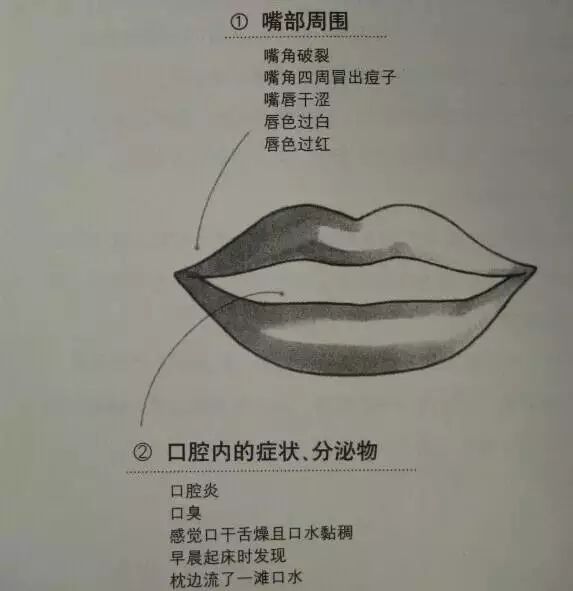
1. Symptoms Around the Mouth
Cracked corners of the mouth — Caused by gastritis leading to false appetite.
Acne around the corners of the mouth — Weak gastrointestinal function.
Dry lips — Increased body temperature can cause dry lips.
Pale lips — Warning sign of insufficient blood.
Red lips — Excessive heat accumulation in the body.
2. Oral Symptoms and Discharges
Stomatitis — Evidence of lowered immunity.
Bad breath — Can have five causes (active gastritis, indigestion, rhinitis, gum disease, dental plaque).
Feeling dry mouth with thick saliva — Overall body dehydration.
Finding a pool of saliva by the pillow in the morning — Weak gastrointestinal function.
Tongue
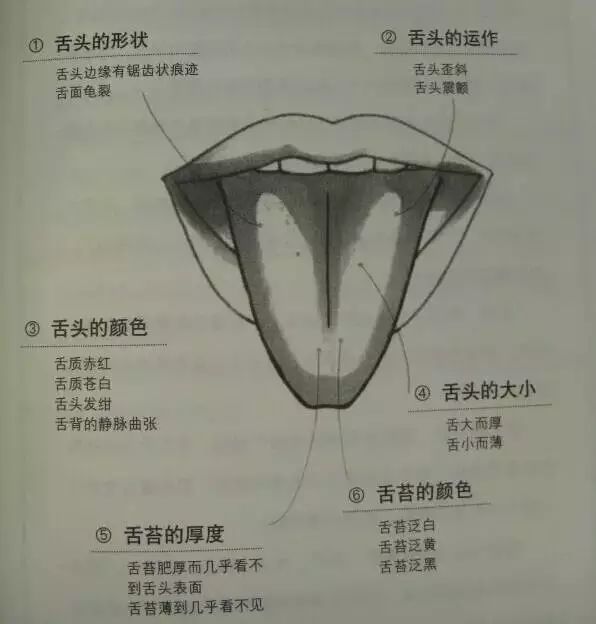
1. Shape of the Tongue
Jagged edges on the tongue — Swelling caused by excessive moisture.
Cracked tongue surface — Insufficient moisture.
2. Movement of the Tongue
Slanted tongue — Signal of cerebrovascular obstruction.
Trembling tongue — Indicates body weakness.
3. Color of the Tongue
Red tongue body — Elevated body temperature.
Pale tongue body — Weak constitution.
Purple tongue — Signal of overly thick blood.
Varicose veins on the tongue surface — Dangerous signal of poor blood flow.
4. Size of the Tongue
Large and thick tongue — Excess moisture in the body.
Small and thin tongue — Insufficient moisture in the body.
5. Thickness of the Tongue Coating
Thick tongue coating, almost obscuring the tongue surface — Gastrointestinal disorders or serious diseases.
Thin tongue coating, almost invisible — Weak body or allergic constitution.
6. Color of the Tongue Coating
White tongue coating — Low body temperature, reduced body function.
Yellow tongue coating — Indicates internal “heat”.
Black tongue coating — Indicates extreme physical exhaustion.
Nose
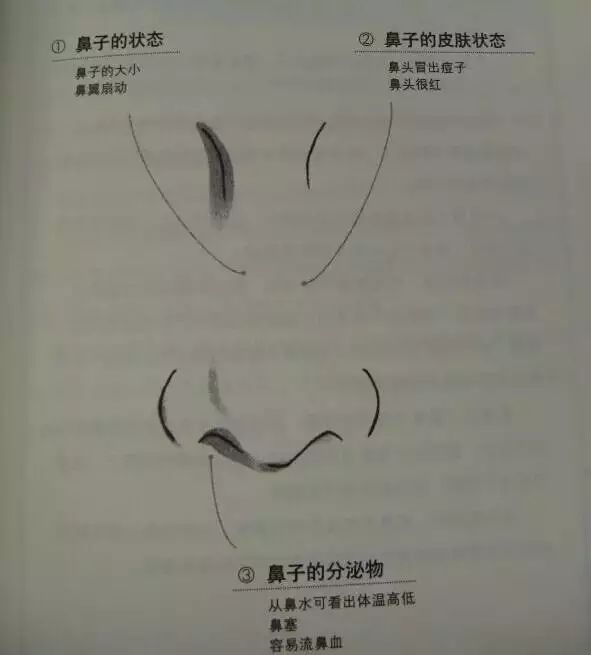
1. Condition of the Nose
Nose size — Strength of respiratory function.
Nostrils flaring — Difficulty in breathing.
2. Skin Condition of the Nose
Acne on the nose tip — Possible respiratory issues.
Red nose tip — Signal of excessive alcohol consumption.
3. Nasal Discharges
Nasal discharge can indicate body temperature — Treatment of colds based on the type of nasal discharge.
Nasal congestion — If ignored, it can lead to systemic hypoxia.
Frequent nosebleeds — Often caused by weak gastrointestinal function.
Cheeks
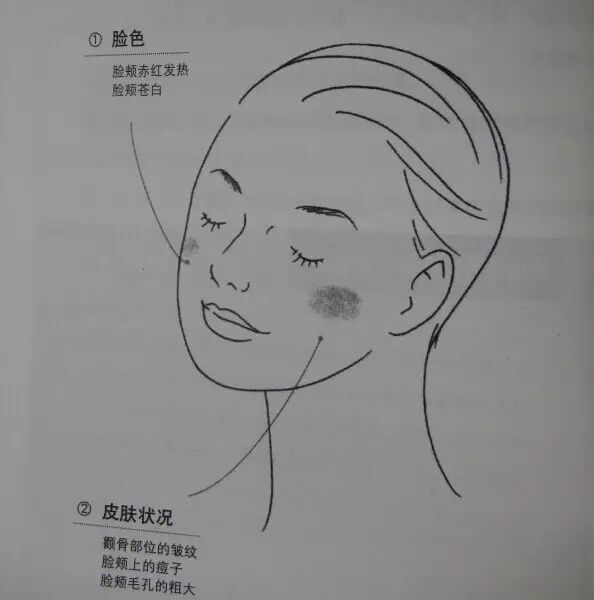
1. Complexion
Red and hot cheeks — Abnormal body temperature regulation.
Pale cheeks — Insufficient oxygen supply in the body.
2. Skin Condition
Wrinkles on the cheekbones — Mainly caused by ultraviolet rays.
Acne on the cheeks — Pay attention to diet excess or constipation.
Enlarged pores on the cheeks — Reduced sebum is the main cause of enlarged pores.
Teeth
1. Condition of the Teeth
Prone to cavities — A sign of osteoporosis.
Gray teeth — Indicates the formation of cavities inside the teeth.
2. Condition of the Gums
Swollen gums — Gastritis or fatigue.
Bleeding gums — Gum inflammation or weak gastrointestinal function.
Hair
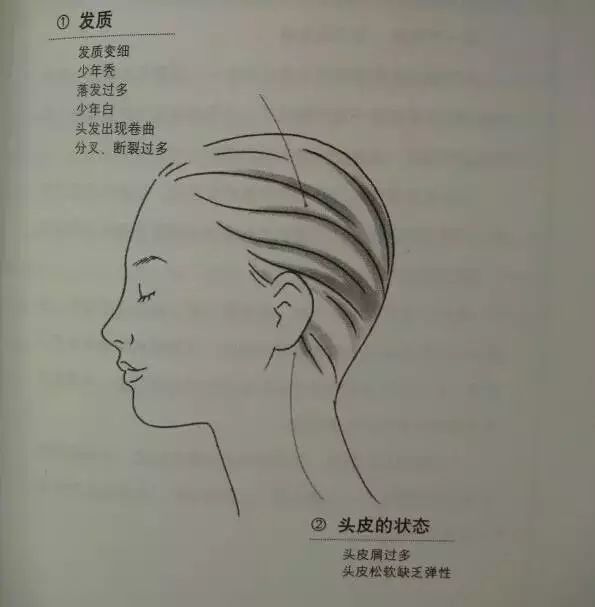
1. Hair Quality
Thinning hair — Tendency towards anemia or signs of aging.
Juvenile baldness — Excessive fat intake can deplete hair (reproductive organ decline).
Excessive hair loss — Hair loss can indicate early signs of disease.
Premature graying — Relationship between calcium and hair.
Curly hair — Thinning hair quality.
Excessive split ends and breakage — Menstrual periods can cause hair anemia.
2. Condition of the Scalp
Excessive dandruff — Divided into “dry” (iron and protein supplementation) and “oily” (improving fat metabolism, supplementing Vitamin B) types.
Soft and lacking elasticity scalp — Symptoms of swelling.
Nails
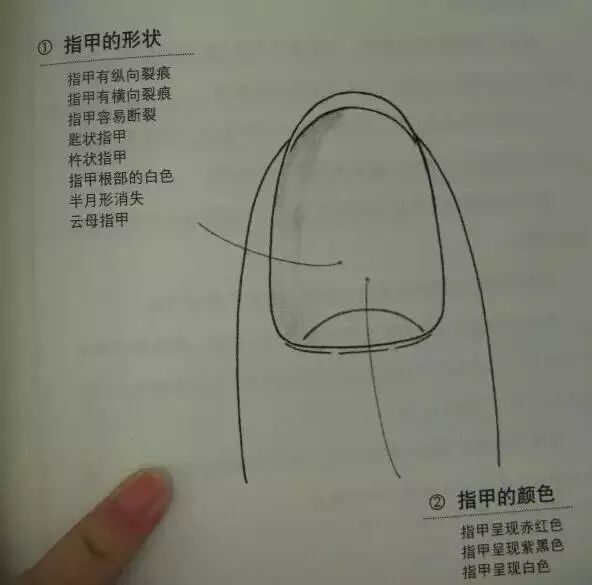
1. Shape of the Nails
Longitudinal cracks in the nails — “Wrinkles” formed by aging.
Transverse cracks in the nails — Indicate records of “past” (body discomfort).
Nails prone to breakage — Anemia or poor liver function.
Spoon nails — Body’s distress signal (severe anemia, uterine fibroids, endometriosis; detailed examination recommended).
Clubbing nails (feeling of pressure deformity) — Common in individuals with heart disease.
Disappearance of the white crescent at the nail base — Physical decline.
Micaceous nails — Nails appear dry.
2. Color of the Nails
Red nails — Blood too thick (pay attention to cardiovascular health).
Purple-black nails — Murky blood or poor heart function.
White nails — Tendency towards anemia.
Warm Reminder: The prescriptions mentioned in this article are for clinical reference only; non-TCM professionals should not attempt these prescriptions without guidance.

Click “Read the Original“↙ to see more exciting content.
Exciting Links: This TCM practitioner has a unique method for treating retinitis pigmentosa; how does he attract foreign patients?
Frequent blinking for seven to eight years, one prescription cured it in ten doses.
What should you eat to nourish the stomach? This TCM guide for stomach nourishment is worth referencing.
Heart disease that repeatedly fails to respond to treatment was cured with this classic formula.
Powerful blood circulation and strong blood stasis resolution. A TCM patent medicine is a hero in breaking up blood stasis.
